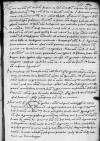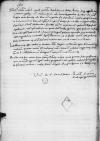Meminimus Vestram Reverendissimam Dominationem nobis scripsisse, quod una cum magnifico domino Georg von Baysen (Jerzy Bażyński) (*1469 – †1546), 1503-1512 Chamberlain of Marienburg (Malbork); 1512-1546 Voivode of Marienburg (PSB 1, p. 377)⌊Mariemburgensi palatinoGeorg von Baysen (Jerzy Bażyński) (*1469 – †1546), 1503-1512 Chamberlain of Marienburg (Malbork); 1512-1546 Voivode of Marienburg (PSB 1, p. 377)⌋ commissum a sacra Sigismund I Jagiellon (Zygmunt I) (*1467 – †1548), King of Poland and Grand Duke of Lithuania (1506-1548); Duke of Głogów (Glogau) (1499-1506), Duke of Opava (1501-1506), Governor of Silesia (1504-1506); son of King Kazimierz IV Jagiellon and Elisabeth of Austria⌊maiestate regiaSigismund I Jagiellon (Zygmunt I) (*1467 – †1548), King of Poland and Grand Duke of Lithuania (1506-1548); Duke of Głogów (Glogau) (1499-1506), Duke of Opava (1501-1506), Governor of Silesia (1504-1506); son of King Kazimierz IV Jagiellon and Elisabeth of Austria⌋ habeat, ut Gdańsk (Danzig, Dantiscum), city in northern Poland, on the Bay of Gdańsk at the mouth of the Vistula, on the Baltic, the biggest and wealthiest of the three Great Prussian Cities (Gdańsk, Thorn (Toruń), and Elbing (Elbląg)) with representation in the Council of Royal Prussia; a member of the Hanseatic League⌊GdanumGdańsk (Danzig, Dantiscum), city in northern Poland, on the Bay of Gdańsk at the mouth of the Vistula, on the Baltic, the biggest and wealthiest of the three Great Prussian Cities (Gdańsk, Thorn (Toruń), and Elbing (Elbląg)) with representation in the Council of Royal Prussia; a member of the Hanseatic League⌋ accedat, et statum sanctae religionis, qui modo illic habetur, cognoscat et emendet. Libenter itaque sciremus, quid Vestra Reverendissima Dominatio ea in re fecerit. Defertur enim ad nos, quod quidam cives nituntur suae haeresis consilio inducere modum sub utraque specie communicandi et ceteros prohibitos errores in perniciem ecclesiae et religioni excitandi. Quapropter Vestra Reverendissima Dominatio dignetur bona ratione elidere istas eorum pravas intentiones, de facili enim qui sint, ex fructibus eorum eos cognoscet. Metuendum enim est, si dudum dissimulabitur, ne deteriora prioribus emergant et praesertim sacra Sigismund I Jagiellon (Zygmunt I) (*1467 – †1548), King of Poland and Grand Duke of Lithuania (1506-1548); Duke of Głogów (Glogau) (1499-1506), Duke of Opava (1501-1506), Governor of Silesia (1504-1506); son of King Kazimierz IV Jagiellon and Elisabeth of Austria⌊maiestate regiaSigismund I Jagiellon (Zygmunt I) (*1467 – †1548), King of Poland and Grand Duke of Lithuania (1506-1548); Duke of Głogów (Glogau) (1499-1506), Duke of Opava (1501-1506), Governor of Silesia (1504-1506); son of King Kazimierz IV Jagiellon and Elisabeth of Austria⌋ hisce temporibus aliis negotiis, ut ipsa non ignorat, distracta et occupata existente. Habebit Vestra Reverendissima Dominatio a domino Deo praemium et laude non infima dignabitur.
Ex nundinis vero Vratislaviensibus nobis scribitur, quod Charles V of Habsburg (*1500 – †1558), ruler of the Burgundian territories (1506-1555), King of Spain as Charles I (1516-1556), King of Naples and Sicily, King of the Romans (1519-1530), Holy Roman Emperor of the German Nation (elected 1519, crowned 1530, abdicated 1556); son of Philip I the Handsome and Joanna the Mad of Castile⌊imperialis maiestasCharles V of Habsburg (*1500 – †1558), ruler of the Burgundian territories (1506-1555), King of Spain as Charles I (1516-1556), King of Naples and Sicily, King of the Romans (1519-1530), Holy Roman Emperor of the German Nation (elected 1519, crowned 1530, abdicated 1556); son of Philip I the Handsome and Joanna the Mad of Castile⌋ omnino hoc vere ventura sit in Italy (Italia)⌊ItaliamItaly (Italia)⌋ cum exercitu non spernendo et quod iam sua maiestas habeat in Germany (Germania, Niemcy)⌊GermaniaGermany (Germania, Niemcy)⌋ sedecem milia militum mercenariorum, sed nescitur, quid sua maiestas intendat. Scribitur etiam, quod principes Germaniae propter universalem concordiam in Germany (Germania, Niemcy)⌊GermaniaGermany (Germania, Niemcy)⌋ restituendam sollicitent Charles V of Habsburg (*1500 – †1558), ruler of the Burgundian territories (1506-1555), King of Spain as Charles I (1516-1556), King of Naples and Sicily, King of the Romans (1519-1530), Holy Roman Emperor of the German Nation (elected 1519, crowned 1530, abdicated 1556); son of Philip I the Handsome and Joanna the Mad of Castile⌊caesaream maiestatemCharles V of Habsburg (*1500 – †1558), ruler of the Burgundian territories (1506-1555), King of Spain as Charles I (1516-1556), King of Naples and Sicily, King of the Romans (1519-1530), Holy Roman Emperor of the German Nation (elected 1519, crowned 1530, abdicated 1556); son of Philip I the Handsome and Joanna the Mad of Castile⌋ pro concilio celebrando quodque spes habeatur caesarem istud facturum, etia paper damaged⌈[ia]ia paper damaged⌉m si Paul III (Alessandro Farnese) (*1468 – †1549), 1493 elevated to cardinal; 1524 Cardinal-Bishop of Ostia; 1534-1549 Pope⌊sanctissimus dominusPaul III (Alessandro Farnese) (*1468 – †1549), 1493 elevated to cardinal; 1524 Cardinal-Bishop of Ostia; 1534-1549 Pope⌋ noster renueret.
Scribitur etiam, quod parlamen paper damaged⌈[amen]amen paper damaged⌉tum France (Gallia, Francia), the kingdom⌊GalliaeFrance (Gallia, Francia), the kingdom⌋ multos insignes viros propter haeresim Luterianam(!) damna paper damaged⌈[mna]mna paper damaged⌉verit et igni tradiderit idemque et reverendissimus Erard de la Marck (d' Arenberg, Eberhard de la Marck) (*1472 – †1538), in 1507 accompanied Louis XII on his expedition against Genoa; 1506-1538 Prince-Bishop of Liège, 1507-1525 Bishop of Chartres, 1520 Archbishop of Valencia, 1521 elevated to cardinal, 1505 Louis XII of Valois' envoy at the court of Emperor Maximilian I (DE VOCHT 1961, p. 134)⌊dominus LeodiensisErard de la Marck (d' Arenberg, Eberhard de la Marck) (*1472 – †1538), in 1507 accompanied Louis XII on his expedition against Genoa; 1506-1538 Prince-Bishop of Liège, 1507-1525 Bishop of Chartres, 1520 Archbishop of Valencia, 1521 elevated to cardinal, 1505 Louis XII of Valois' envoy at the court of Emperor Maximilian I (DE VOCHT 1961, p. 134)⌋ et serenissimus John III of Portugal (John the Pious, João III Aviz) (*1502 – †1557), 1521-1557 King of Portugal; son of Manuel I, King of Portugal, and Maria of Aragon⌊rex PortugaliaeJohn III of Portugal (John the Pious, João III Aviz) (*1502 – †1557), 1521-1557 King of Portugal; son of Manuel I, King of Portugal, and Maria of Aragon⌋ fecisse dicitur. Sparguntur enim ista dogmata passim per universum mundum, quae homines corrumpunt. Sacra tamen Sigismund I Jagiellon (Zygmunt I) (*1467 – †1548), King of Poland and Grand Duke of Lithuania (1506-1548); Duke of Głogów (Glogau) (1499-1506), Duke of Opava (1501-1506), Governor of Silesia (1504-1506); son of King Kazimierz IV Jagiellon and Elisabeth of Austria⌊maiestas regiaSigismund I Jagiellon (Zygmunt I) (*1467 – †1548), King of Poland and Grand Duke of Lithuania (1506-1548); Duke of Głogów (Glogau) (1499-1506), Duke of Opava (1501-1506), Governor of Silesia (1504-1506); son of King Kazimierz IV Jagiellon and Elisabeth of Austria⌋, serenissimus dominus noster, his diebus ad omnes dignitarios et capitaneos edictum misit severum, dogmata et libros prohibendo, et iubet punire severe tali haeresi contaminatos atque a studiis haereticorum revocat adulescentes sub poena perpetui exilii. Et iam aliquot redierunt ex Wittenberg (Vittemberga), city in east-central Germany, Saxony, on the Elbe river, 70 km NE of Leipzig⌊VitembergaWittenberg (Vittemberga), city in east-central Germany, Saxony, on the Elbe river, 70 km NE of Leipzig⌋.
 BCz, 249, p. 168
BCz, 249, p. 168
Scribitur etiam nobis, quod quidam adulescens doctus, Anani text damaged⌈[i]i text damaged⌉anus appellatus, natione Gallus, cum Philipp Melanchthon (Philipp Schwartzerd) (*1497 – †1560), Lutheran theologian, humanist, Martin Luther's collaborator and friend, author of the Augsburg Confession. He was strongly influenced by Luther, whom he called his spiritual father. In 1519 he was present as a spectator at the disputation of Leipzig between Martin Luther and Johann Eck. He was also in attendance at the Diet of Augsburg (1530) and at the religious colloquy of Worms (1557)⌊MelanctonePhilipp Melanchthon (Philipp Schwartzerd) (*1497 – †1560), Lutheran theologian, humanist, Martin Luther's collaborator and friend, author of the Augsburg Confession. He was strongly influenced by Luther, whom he called his spiritual father. In 1519 he was present as a spectator at the disputation of Leipzig between Martin Luther and Johann Eck. He was also in attendance at the Diet of Augsburg (1530) and at the religious colloquy of Worms (1557)⌋ ab Philipp von Wittelsbach der Streitbare (*1503 – †1548)⌊lanthgrabio HessiaePhilipp von Wittelsbach der Streitbare (*1503 – †1548)⌋ veniens, Leipzig (Lipsia), city in southern Germany, Saxony⌊LipsiaeLeipzig (Lipsia), city in southern Germany, Saxony⌋ vita functus est. Cui cum negata sit sepultura Leipzig (Lipsia), city in southern Germany, Saxony⌊LipsiaeLeipzig (Lipsia), city in southern Germany, Saxony⌋ propter haeresim, a Luteranis in Wittenberg (Vittemberga), city in east-central Germany, Saxony, on the Elbe river, 70 km NE of Leipzig⌊VitembergamWittenberg (Vittemberga), city in east-central Germany, Saxony, on the Elbe river, 70 km NE of Leipzig⌋ solemniter ductus est et illic magna pompa sepultus, quem Philipp Melanchthon (Philipp Schwartzerd) (*1497 – †1560), Lutheran theologian, humanist, Martin Luther's collaborator and friend, author of the Augsburg Confession. He was strongly influenced by Luther, whom he called his spiritual father. In 1519 he was present as a spectator at the disputation of Leipzig between Martin Luther and Johann Eck. He was also in attendance at the Diet of Augsburg (1530) and at the religious colloquy of Worms (1557)⌊MelanctonPhilipp Melanchthon (Philipp Schwartzerd) (*1497 – †1560), Lutheran theologian, humanist, Martin Luther's collaborator and friend, author of the Augsburg Confession. He was strongly influenced by Luther, whom he called his spiritual father. In 1519 he was present as a spectator at the disputation of Leipzig between Martin Luther and Johann Eck. He was also in attendance at the Diet of Augsburg (1530) and at the religious colloquy of Worms (1557)⌋ funebri oratione deplorans Polonum apostolum appellavit, nam ipse adulescens, quia domino Jan Łaski (Ioannes de Lasco) (*1456 – †1531), 1503-1513 Grand Chancellor of the Kingdom of Poland, 1510-1531 Archbishop of Gniezno and Primate of Poland (PSB 18, p. 229-237 ; TAFIŁOWSKI 2007)⌊LaskyJan Łaski (Ioannes de Lasco) (*1456 – †1531), 1503-1513 Grand Chancellor of the Kingdom of Poland, 1510-1531 Archbishop of Gniezno and Primate of Poland (PSB 18, p. 229-237 ; TAFIŁOWSKI 2007)⌋ servivit, pro Polono in studio Vitembergensi habitus est, inquiens Poland (Kingdom of Poland, Polonia)⌊regnum PoloniaePoland (Kingdom of Poland, Polonia)⌋ ex morte eius recepisse irrecuperabilem iacturam. Ipsum enim superinscribed⌈enimenim superinscribed⌉ asserens ad id fuisse doctum, ut Polonos sua doctrina in viam salutis restitueret et ab errore evelleret.
Intelleximus istic vobis a sacra Sigismund I Jagiellon (Zygmunt I) (*1467 – †1548), King of Poland and Grand Duke of Lithuania (1506-1548); Duke of Głogów (Glogau) (1499-1506), Duke of Opava (1501-1506), Governor of Silesia (1504-1506); son of King Kazimierz IV Jagiellon and Elisabeth of Austria⌊maiestate regiaSigismund I Jagiellon (Zygmunt I) (*1467 – †1548), King of Poland and Grand Duke of Lithuania (1506-1548); Duke of Głogów (Glogau) (1499-1506), Duke of Opava (1501-1506), Governor of Silesia (1504-1506); son of King Kazimierz IV Jagiellon and Elisabeth of Austria⌋ in Marienburg (Malbork), town and castle in northern Poland, Pomeranian Voivodeship, on the Nogat river, a branch of the Vistula at its delta, the capital of the Grand Masters of the Teutonic Order in Prussia (1309-1457), a voivodeship capital in Royal Prussia, which belonged to the Kingdom of Poland (1466-1772). Marienburg (taking turns with Graudenz (Grudziądz)) was the venue for the Provincial Diets of Royal Prussia, which were chaired by the bishop of Ermland (Warmia)⌊MarienborgaMarienburg (Malbork), town and castle in northern Poland, Pomeranian Voivodeship, on the Nogat river, a branch of the Vistula at its delta, the capital of the Grand Masters of the Teutonic Order in Prussia (1309-1457), a voivodeship capital in Royal Prussia, which belonged to the Kingdom of Poland (1466-1772). Marienburg (taking turns with Graudenz (Grudziądz)) was the venue for the Provincial Diets of Royal Prussia, which were chaired by the bishop of Ermland (Warmia)⌋ conventum esse indictum, quare autem sit indictus nunc, rationem nobiscum exquirimus. Vestra tamen Reverendissima Dominatio nobis scribere non dedignetur rationem eius conventus.
Residentes hic circa hanc sanctam ecclesiam in loco avio, pauca scire possumus, quae in mundo aguntur, igitur nobis pergratum erit, quando nobis saepius scribet. Et feliciter valeat nosque fraterne diligat.



 BCz, 249, p. 170
BCz, 249, p. 170